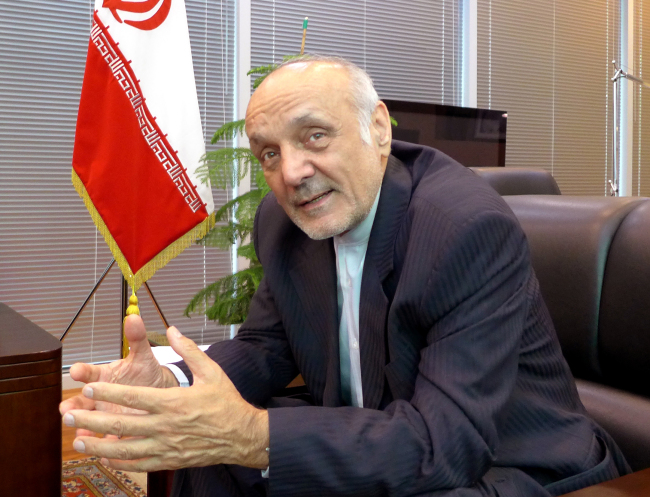Following the lifting of international sanctions on Iran’s nuclear program, fresh opportunities have dawned across the country’s vast, rising economy, opening doors to long-term investments, according to the top Iranian envoy to Korea.
In an interview with The Korea Herald, Iranian Ambassador Hassan Taherian stressed that in order to make the most out of the second-largest market in the Middle East and North Africa region, Korean companies should have a long-term vision for business engagement.
“The economic needs of Iran and Korea are highly complementary,” he underlined at the embassy in Seoul. “Iran wants to absorb international investment to modernize and diversify its economy, while Korea is targeting overseas markets to break out of the stalemate back home.”
Following the end of 10-year sanctions imposed by the United Nations Security Council in 2006 after Tehran refused to suspend its uranium enrichment program, Iran has been inundated with foreign companies reentering its markets, according to the ambassador.
German, Italian, British, French, Chinese and Japanese companies that previously operated in or traded with Iran have returned, along with numerous business delegations.
Last April in Lausanne, Switzerland, Iran and the U.S., U.K., Russia, France, China, Germany and the European Union reached a historic accord known as the Joint Comprehensive Plan of Action, to curb Tehran’s nuclear development program. The agreement was implemented on Jan. 16.
“The superpowers got their security guarantee of a nonnuclear Iran, while Iran secured an economic assurance of renewed international engagement,” Taherian noted. “As far as the economy is concerned, everything is returning to normalcy. All stakeholders gained from their diplomatic bargain.”
Korean President Park Geun-hye’s state visit in early May was both “symbolic and substantial” as the first presidential visit between the two countries, he said. “President Park added a momentum to our relations by leveraging support for our diplomatic, economic and cultural ties.”
As part of the state visit, 19 ministerial-level memorandums of understanding were signed, including two treaties related to the justice ministries. Over 35 agreements were inked between companies.
Estimating the total value of those 55 agreements at $35 billion, the ambassador said: “What’s important is the implementation and realization of these documents, not their signing.”
According to Korea’s Ministry of Foreign Affairs, Korean companies can reap fortunes in Iran’s petroleum and natural gas, petrochemicals, shipping, shipbuilding, infrastructure, housing and construction, machinery, automobile production, steelmaking, mining and precious metals industries.
With 80 million people -- the second-largest in the region after Egypt -- Iran is a booming market with surging demands. It has the world’s second-largest natural gas reserves and fourth-largest oil reserves. Tehran has identified 50 oil and gas projects worth $185 billion for foreign investment to be signed by 2020.
Iran is surrounded by regional markets with a total of 350 million people, including landlocked countries in Central Asia, the Caucasus, Iraq, Afghanistan and Pakistan. Largely free from terrorism, Iran is a safe and secure haven on which to launch global operations, Taherian argued.
For Korean companies to succeed, he added, they should make attempts to stay in the country and build reliable, trust-based relations with local partners.
“To succeed, Korean firms should have a long-term plan for engagement and investment,” Taherian advised. “Merely trying to sell finished products or siphon off profits will help neither side. To create a win-win, Korean companies can set up joint ventures with Iranian counterparts and help increase their export capacities.”
As concrete steps, he suggested installing production lines in Iran, using Iranian subcomponents in production, transferring knowledge and technology, supplying capital in construction projects and establishing joint projects targeting third markets. Manufacturing, information communications technology, telecommunication, health care, transportation and renewable energy sectors hold promise, he added.
Analysts have advised moving beyond traditional sectors of petroleum, natural gas, petrochemicals, steel and construction, and penetrating the services industry, which makes up half of Iran’s gross domestic product.
“We have for the last several years made concerted efforts to diversify our economy and reduce dependence on the oil industry,” the diplomat emphasized, adding that the percentage of oil revenues has continuously dropped in state budget.
“We are preparing ourselves for the post-oil economy. Oil and gas are still the bulk of our natural resource revenue, but we want to use these earnings as investment in other sectors, such as steelmaking, manufacturing, automobile production and construction.”
In line with the world’s united transition to green energies, he said Iran is also nurturing clean and renewable powers, particularly solar, geothermal, wind and hydro.
As a stumbling block, Taherian acknowledged that banking and financial mechanisms have not been fully normalized bilaterally. The Iranian government and the Korea Eximbank are in the last stage of reestablishing a line of credit as a means of supporting both sides’ commitments, he said.
By Joel Lee (
joel@heraldcorp.com)








